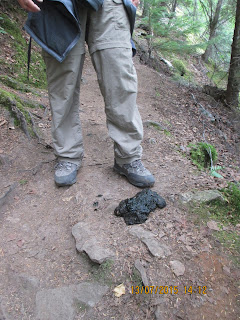The Chilkoot Trail, Monday 13th July
I said goodbye to Whitehorse as together with my guide Benny
and driver Matt we started the two hour journey to Skagway and finally Dyea and
the start of the Chilkoot Trail.
We stopped off at a few places on the way such as the
Carcross Desert.
Deserts require less than ten inches or 25cms precipitation
a year so technically this isn’t a desert (Whitehorse has less rainfall but is
still just above the magic cut off level) but it is an area of active sand
dunes. Judging by the signs and information boards art the side of the road you
would be forgiven for thinking that there is something special about the area
but in reality it is just a few hectares.
It is not a desert, it is not the most northerly active
dunes, nor is it the highest or largest but it is easily accessible right next
to a major road and Carcross is visited by hundreds of tourists on their way
through the Yukon.
It was a dull day but
we stopped at Carcross situated on a short stretch of river that connects Lake
Bennett to Nares Lake and from where some of the sand that makes the desert
comes from.
We crossed the Canadian – USA border and late in the morning
we arrived in Skagway and made our way to the US National Parks Service offices
to collect our passes. Skagway and is one of only two places in USA where the
town centre is a designated national park (the other is Harpers Ferry in West
Virginia). I have been here before and was keen to get on the trail so we
wasted no time and moved on the Dyea.
Dyea was a functioning town at the same time as Skagway just
a few kilometres along the coast with several thousand residents in its hayday.
The Klondikers on their way to the gold fields in Dawson deep in the interior would
either leave Dyea and cross the Chlkoot Trail, an existing First Nation trading
route or leave Skagway and cross the White Pass which was lower, about the same distance but had no established route so requiring a lot of bush whacking.
The whole 53kms of the Chilkoot Trail is a national park
crossing the border with each side maintained by the US National Parks Service
or Canadian Parks and is billed as the longest museum in the world. All the way
along the route are cabins, rusting artefacts, abandoned shoes, mining
equipment, boilers and the paraphernalia of a mining community on the move.
We said goodbye to the warmth and dry of the van and set off
in the rain up the trail.
We were entering bear country…I had been in bear
country now for three weeks and still hadn’t seen a bear. The trail was flat and well surfaced leaving
the road for the first 100m then it narrowed and started going up hill through
temperate rain forest so in no time at all my trousers were wet through.
Do bears poo in the woods? Incontrovertible evidence that
they do.
Bears have excellent sense of smell and eat anything but judging by
the consistency of this particular skat, it had eaten something that had not
agreed with it. It was fresh but I was not about to put my finger in it to test
the temperature.
Benny was a great guide…he let me carry the food and so the
load would get lighter over time and let me go first to set the pace. I had the
food that the bear might smell whilst he followed with the bear spray. That was
a great incentive not to go too fast and lose my guide.
Generally well maintained paths cut through the forest.
We cut through beaver lakes on board walks.
We passed Finnegan’s Point just 8km up the trail, where
Finnegan and his two sons operated a roadhouse, he charged a toll to use the
improved road that led to his entreprise but in winter prospectors just towed
their goods up the frozen river.
We passed through different patches of forest.
Our first stop was Canyon City and we prepared a meal in the
rain. The first two couples had taken refuge in the cabin, Neil and Layla from
Vancouver and Peter and Margerie, Quebecois so we set up our tents in the rain.
A family of six from Anchorage arrived later and over the next few days we
would meet each other several times at camps along the trail.



















No comments:
Post a Comment